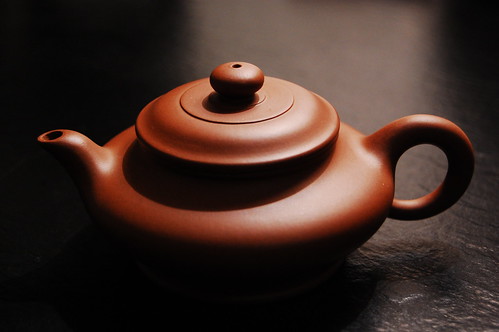Sencha Ashikubo could be blocked under the category of Hika Sencha. Hika is a Japanese word used to describe a roasted aroma, and can be used as a descriptive term for all sencha. Houjicha would be said to have a very strong hika, while most sencha and gyokuro are said to have very little to no hika.
Enough research into a tea will leave a man dying to try some, so I'll dive right in.

The aroma from the dry leaf is especially strong, a pervasive hika that reminds one of roasted barley and grains, but there's also a sweetness to the smell that draws one in closer. The leaf doesn't look any different than your regular asamushi sencha, so I'll use the asamushi time recommendation of 1.5 minutes, with my general sencha parameters of 2tsp/200ml/176°f.

The liquor is a light green-yellow, a pleasant reminder of asamushicha. A strong hika and some light, placid vegetal character make the aroma up into a foody concoction that beckons a rumbling stomach. The mouthfeel is very light, like watery tea-air, and easily slips over the tongue and down the throat. This lightness is reflected in the taste left behind. The overall crisp flavor is made up of flavors of barley-grain, fresh wood (no charcoal), and a stimulating, slightly astringent vegetal-grassiness. A sweet honey after-aroma lingers and adds a nice dimension to the tea.

I expected a sencha that was composed entirely of a barley flavor and left little else to explore. Sencha Ashikubo provided more. The expected barley had a fresh wood quality to it which surprised the senses. To help wash itself down, the tea provided a vegetal quality that wasn't run off by the firing. I noted some astringency, but shaving some time off the steep, and keeping it under 1:20 would have staved it off. But the astringency gave the tea its own palate-cleaning quality which isn't common. I think this sencha would make an excellent after-meal tea, and could be a more pure replacement for the genmaicha cravings. It stands on its own quite well.


11 comments:
Sounds like an excellent green tea without expecting too much involvement.
Barley, grains, sweetness, a hint of astringency... sounds good!
Thanks for the review.
Urges me to try this tea! I must get into this brewing method as well, awesome!
i had notice and posted to your self-study on puerh and storage i posted it here, i dont know if you seen it because you wrote it a year ago. i would like ask how's it going if you are still involved,
you might want to check out my profile...i think it is great work you did.
http://teaarts.blogspot.com/2009/02/we-all-should-be-doing-this.html
icetea8/steven
I have this tea myself (From David's tea too) and it is a huge step up from the traditional Sencha. I find it has a much smoother and more mellow taste then the Sencha, but it definitely has more flavour to it.
I brew it to the package specifications of 75c water for 2-3 mins. I like to lean towards 2 minutes with this tea.
Interesting that the roasting makes it comparable to a foodie tea like Genmaicha. It's good that it was more than just simple barley with some complex flavors. I wonder if the roasting lowers the theine content of this tea.
I love sencha tea. THanks for this review.
I just discovered sencha tea myself and am in love with it. Thanks for the play by play.
Where have all my teachums gone. IM in teachat
If you like this tea you better go to Camellia-sinensis.com , they have two boutiques in Montreal. David's Tea buy it from them, at this place you will find plenty of excellent teas like this one.
CSTS is one of my favorite shops. :)
Jof Victoria says... the description here of this tea is quite accurate...I bought some recently and it is marvelously rich in flavour without being overpowering.. bought it at David's and its a tad expensive
Post a Comment